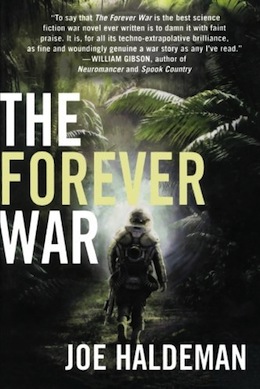Sitting on a peak in the desert, watching a fleeting bright spot in the sky become fainter and fainter, until finally it simply vanishes. When I think of William Mandella from The Forever War, it is that moment perhaps more than any other that passes through my mind.
That spot of light was, of course, a spaceship, and it carried away not only Mandella’s lover, but also the last link to his own reality. For the war in this celebrated novel features not only the pain and savagery endemic to any other conflict, but also its own unique torment. Mandella and his comrades must endure the passage of decades, even centuries, between battles, the result of time dilation when traveling at relativistic speeds. Imagine going off to war, with all that entails, but also knowing that when—if—you return, everyone you left behind will be dead, the culture you remember long gone. When that speck of light disappeared, Mandella was alone, utterly and completely alone, trapped in a human culture that was entirely alien to him.
I’ve been reading science fiction for almost as long as I’ve been reading, which is a long time. Over the years that has added up to a lot of books, many of which I enjoyed to varying degrees, but only a few have joined the exclusive group of novels I’ll pull out every few years and reread. Again. And Joe Haldeman’s Forever War is front and center on that bookshelf.
The Forever War is quite possibly one of the most feted of all science fiction novels, and deservedly so. It is the winner of the Hugo and the Nebula, as well as just about every other award that easily comes to mind. It is an anti-war classic, certainly, but it is more than just that. The book explores not only the horror and the futility of war, but also the way governments can become insensitive and brutal to those who live under them, how people can so easily be stripped of their individuality and become the tools of their masters.
It dares to imagine war in the future as something even more dehumanizing than real world conflict, where soldiers are sent on pointless missions that no more than a third of them are expected to survive. The combats in the book do not portray heroic defenses of the homeland or righteous crusades against an evil enemy. Indeed, they all seem fairly pointless and random, with little purpose except to perpetuate the war itself.
The emptiness of these battles is profound. Though it is clear later in the book that humanity has colonized a number of worlds, there is no sense that the fighting has anything to do with defending any of these. Mandella and his comrades fight a series of battles over inhospitable planets that seem to have less and less of a relationship to protecting Earth and its colonies as the book progresses, moving farther in the direction of war for the sake of war.
In the background of Mandella’s journey through the war, and the passing centuries, we see profound changes in Earth culture and society, all of them resulting from manipulation by the government, through conditioning, propaganda, the imposition of mandated sexuality. The Earth government in The Forever War is a totalitarian one, conditioning and compelling its citizens and soldiers to accept whatever it mandates, and that is something that endures throughout the book, at least until the very end.
The Forever War is a classic of military science fiction, but it is also an incredibly effective dystopia, depicting a dark future, not only one of endless war, but also where concepts like freedom and individuality are almost completely lost. Indeed, Mandella is discharged at one point early on, but he is so disheartened by what he sees on Earth, he returns to the army.
Though I first read the book decades before I became a writer myself, it remains a major inspiration, not just in the rich themes that run through it, but in the quality of the craft itself on exhibit. Few books can match The Forever War in accessibility, in making you feel like you are there. Even the background scenes, like Mandella taking some time to himself after the “8 Silent Ways to Kill a Man” movie, are powerful, and the reader can almost imagine he or she is there, feel the last ditch attempts of this would be physics teacher turned army recruit trying to cling to any semblance of normalcy in his hijacked life.
Still, it is that scene on the lonely peak that stays with me the most…the almost casual separation of Mandella and Marygay, despite, or perhaps because, they are each other’s sole remaining link to their own time. I’ve wondered whether we’re supposed to think it was cold-blooded bureaucracy that assigned them to different units, or something more deliberate intended to complete their transition into cogs in the war machine. And I’ve gone back and forth on which I thought was worse.
Jay Allan is a former investor and the author of the Crimson Worlds series. When not writing, he enjoys traveling, running, hiking and reading. He loves hearing from readers and always answers e-mails. He currently lives in New York City. Funeral Games, the third book in the Far Stars trilogy, is out now from HarperVoyager.










